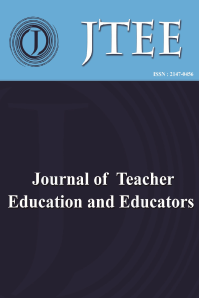Ortaokul Öğrencilerinin ve Öğretmenlerinin Öğrenme ve Öğ- retmeye İlişkin Metaforik Algıları
Bu araştırmanın amacı ortaokul öğrenci ve öğretmenlerinin, öğretme ve öğrenme kavramlarına ilişkin metaforik algılarını araştırmaktır. Bu yüzden, öğrencilerin öğrenme ve öğretmeye ilişkin metaforik algıları ve öğretmenlerin öğretmen olmaya ve öğretmeye ilişkin metaforik algılarıaraştırılmıştır. Araştırma modeli olarak fenomenolojik yaklaşım benimsenmiştir. Çalışma grubunu 2014-2015 eğitim öğretim yılında Kocaeli ilindeki bir ortaokuldan 8. Sınıftaki 48 öğrenci ve onların öğretmenleri (8 branş öğretmeni) oluşturmuştur. Araştırmanın verileri, araştırmacılar tarafından geliştirilmiş olan yarı yapılandırılmış görüşme formu aracılğı ile toplanmıştır. Veriler içerik analizi yöntemi incelenmiştir. Araştırmanın bulguları öğrencilerin öğrenci olmayı ‘çaba ve gayret, gelişme ve büyüme, değişkenlik, zorlanma, bir amaca ulaşma’olarak algıladıklarını göstermiştir. Sınıfta öğrenmeye ilişkin olarak ise elde edilen metaforlar dokuz kategoride sınıflandırılmıştır. Sekiz branş öğretmeninden elde edilen metaforlardan öğretmen olmaya ve öğretmeye ilişkin ‘çaba ve gayret, gelişme ve yönlendirme ’ kategorileri ortaya çıkmıştır
Anahtar Kelimeler:
Ortaokul öğrencileri, öğretmen, öğrenci, öğretme metaforları, öğrenme metaforları
Metaphorical Perceptions of Secondary School Students and Teachers about Learning and Teaching Concepts
The purpose of this paper is to explore perceptions of students and teachers about learning, and teaching concepts. Therefore, metaphorical perceptions of students about being a student and learning, and metaphorical perceptions of teachers about being a teacher and teaching were examined. The phenomenology approach was chosen as a research model. The study group consists of 8 8th grade students and their teachers (8 branch teachers of those classes) from a secondary school in Kocaeli in the 2014-2015 educational year. Research data was collected through semi-structured forms developed by the researchers.The data were analyzed through content analysis. The results indicated that students’ perceptions of being a student are categorized as ‘effort and struggle’, ‘improvement and growth’, ‘achieving a goal’, ‘versatility’, and ‘being forced’. Nine categories related to the metaphors about learning in their classroom were revealed. Teachers developed metaphors categorized as ‘effort and struggle’, ‘improvement’, and ‘leading’
Keywords:
Secondary school, teacher, student, teaching metaphors, learning metaphors,
___
- Alger, C. L. (2009). Secondary teachers' conceptual metaphors of teaching and learning: Changes over the career span. Teaching and Teacher Education, 25 (5), 743-751.
- Balcı, A. (1999). Metaphorical images of school: school perceptions of students, teachers and parents from four selected schools (in Ankara). (Unpublished Doc- toral Dissertation).METU Institute of Social Sciences, Ankara.
- Çelikten, M. (2006). Kültür ve öğretmen metaforları. Sosyal Bilimler Enstitüsü, 21 (2), 269-283.
- Dönmez, Ö. (2008). Türk Eğitim Sisteminde Kullanılan Yönetici Metaforları-Kayseri İli Örneği. (Unpublished Master Thesis). Kayseri: Erciyes Üniversitesi Sosyal Bilimler Enstitüsü.
- Goldstein, L. S. (2005). Becoming a teacher as a hero‟s journey: using metaphor in pre-service teacher education. Teacher Education Quarterly, 32(1), 7-24
- Lakoff, G., & Johnson, M. (1980). Metaphors we live by. Humans as Symbolic Creatures (p. 124-134)inMarshall, H. H. (1988). Work or Learning Implications of classroom metaphors.Retrieved on 5 20, 2015 from http://er.aera.net
- McMillan, J. J., & Cheney, G. (1996). The student as consumer: The implications and limitations of a metaphor. Communication Education, 45 (1), 1-15.
- Morgan, G. (1998). Yönetim ve Örgüt Teorilerinde Örgüt Metaforları. (G. Bulut, Çev.) İstanbul: Mess Yayınları.
- Miles, M. B., &Huberman, A. M. (1994). Qualitative Data Analysis(ThousandOaks, CA: Sage).
- Saban, A. (2008). Okula ilişkin metaforlar. Educational Administration: Theory and Practice, 55, 459-496.
- Thomas, L. & Beauchamp, C. (2011). Understanding new teachers‟ professional iden- tities through metaphor. Teaching and Teacher Education, 27 (4), 762-769.
- Toker-Gökçe, A., & Bülbül, T. (2014). Okul bir insan bedenidir: Meslek lisesi öğrencilerinin okul algılarına yönelik bir metafor çalışması. Eğitim Bilimleri Araştırmaları Dergisi, 4 (1), 63-88. http://ebad-jesr.com/
- Yıldırım, A. &Şimşek, H. (2008). SosyalBilimlerdeNitelAraştırmaYöntemleri.Ankara: SeçkinYayıncılık.
- ISSN: 2147-0456
- Başlangıç: 2012
- Yayıncı: İlknur GÖKÇE
Sayıdaki Diğer Makaleler
Ortaokul Öğrencilerinin ve Öğretmenlerinin Öğrenme ve Öğ- retmeye İlişkin Metaforik Algıları
Özlem URAL, İbrahim AYDEMİR, Asiye TOKER-GÖKÇE, Zehra ÖZTOPRAK-KAVAK
Yunan Okul Müdürlerinin Öğretmenlerin Performanslarını Değer- lendirmeye Yönelik Yeterlik İnançları
Kalliope KALTSONOUDİ, Anastasia Athanasoula-Reppa
Sosyokültürel Bir Bakış Açısıyla İki Dilli / İDİ Öğretmen Adaylarının Kimliği
Alexandra BEKİARİ, Polyxeni MANOLİ
Bir Öğretmenin Eğitim Programının Yapılanması: Teknolojik Uyarlama İçin Bir Strateji
ángela María Alfaro ESCOBAR, Marcela Georgina Gómez ZERMEÑO, Lorena Alemán De La GARZA
İngilizce Yeterlilik Endeksi Verileri Işığında Türkiye’nin Yeri
